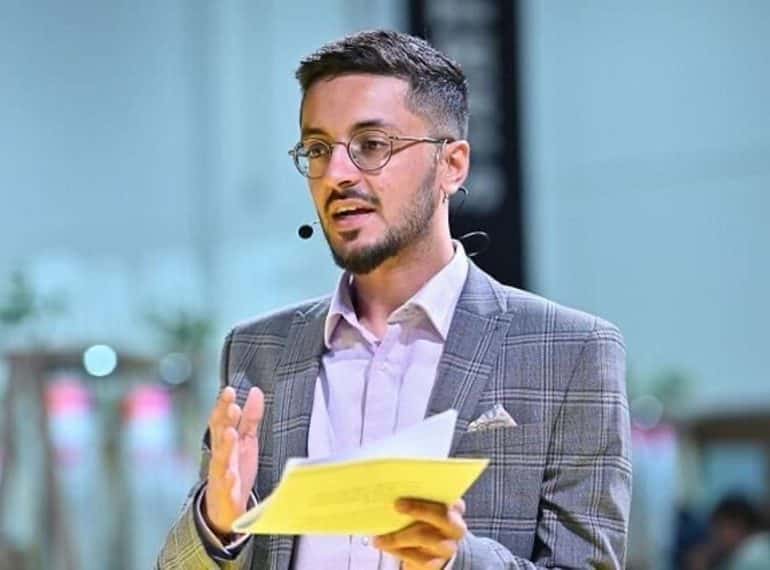
OId Elizabethan Akshay Ruparelia has been named in one of the influential Forbes 30 Under 30 lists, following the success of his online estate agency.
 Still only 22, Akshay (OE 2009–2016) is the youngest person named on the Europe Technology list and is significantly younger than the Forbes Under 30 Europe lists’ average age of 27.
Still only 22, Akshay (OE 2009–2016) is the youngest person named on the Europe Technology list and is significantly younger than the Forbes Under 30 Europe lists’ average age of 27.
Published annually by Forbes magazine since 2011, the lists recognise young people achieving success across a number of sectors.
In the citation for Akshay, the judges noted that his company, Doorsteps, has not only raised £1.4m in investment funding, but that last year it generated more than $2m (£1.46m) in revenue, turning a profit for the first time. Charging a flat £99 to sell a home with no commission, it has sold properties worth more than £1bn to date.
Responding to news of the accolade, Akshay said that the list was one he had always aspired to be in and that he was humbled by his inclusion. “This may be a recognition of my determination, but [is also] greater recognition that I have the right people in our Doorsteps.co.uk team.”
He paid tribute to the love and support from his family, friends and advisers. Akshay added that the award “doesn’t mean success, yet” but was “a nod to the hard work, grit and commitment of those excelling in their field.
“Onwards and upwards. This is just the start, and yet it if all disappears tomorrow, we’ll go and try again.”
The past year has been a busy time for Akshay. In addition to steering Doorsteps to profitability, his coaching and consulting business has been named a Department of Work and Pensions Approved Kickstart Gateway. The Kickstart scheme aims to help young people facing long-term unemployment because of Covid-19.
In March last year, Akshay became a board member of The Prince’s Trust’s RISE2025 campaign, which comprises a group of young professionals committed to social change and social mobility.
And since May 2020, he has been an ambassador for the Royal Association for Deaf People.
As Akshay explained to the boys on a visit to QE in 2018, his parents, a care worker and a teaching assistant, are both deaf, so in addition to the customary demands on a QE boy’s time, he had responsibilities in caring for them. He had therefore been motivated to start Doorsteps by a desire for financial freedom, he said.
Akshay, who had already displayed his entrepreneurial inclinations at school by selling sweets and perfume, spent the first year of his A-level studies working on an app to help people buy homes cheaply and easily. He then used the lessons he had learned to create Doorsteps.co.uk.
In an interview with Forbes Advisor UK last summer, he stated that his ambition remained for Doorsteps to be the UK’s number one agency. “But in life,” he added, “I want to leave a legacy and to make a difference. I want to make a fundamentally positive difference in a way that can inspire or drive changes in individual lives, across the country, or world. And I want to help my parents retire in whatever way they desire.”

 And the ship’s purpose – gathering data about the oceans for scientists looking at climate change, pollution and marine conservation – points to an area of focus for Andrew, namely sustainability.
And the ship’s purpose – gathering data about the oceans for scientists looking at climate change, pollution and marine conservation – points to an area of focus for Andrew, namely sustainability. He worked briefly for specialist IT training consultancy Optimum Technology Transfer – “a really good job” – and then went to IBM in 2017.
He worked briefly for specialist IT training consultancy Optimum Technology Transfer – “a really good job” – and then went to IBM in 2017.
 His ten-minute conversation with Year 13 pupils Thomas Mgbor and Ayodimeji Ojelade was recorded so that the issues raised can be discussed in tutor groups. It is one of a series of Perspective discussions being arranged by the School’s Equality, Diversity and Inclusion Ambassadors. Last year, Ayodimeji and Thomas were instrumental in the founding of Perspective – a new forum set up in the wake of the Black Lives Matter protests.
His ten-minute conversation with Year 13 pupils Thomas Mgbor and Ayodimeji Ojelade was recorded so that the issues raised can be discussed in tutor groups. It is one of a series of Perspective discussions being arranged by the School’s Equality, Diversity and Inclusion Ambassadors. Last year, Ayodimeji and Thomas were instrumental in the founding of Perspective – a new forum set up in the wake of the Black Lives Matter protests. Bilal continued: “It’s the cumulative impact of loads of micro-aggressions that really makes someone feel like ‘I don’t belong here’ or ‘I am angry’ or ‘I am ashamed’ or perhaps that there is ‘something about me that is not right’.”
Bilal continued: “It’s the cumulative impact of loads of micro-aggressions that really makes someone feel like ‘I don’t belong here’ or ‘I am angry’ or ‘I am ashamed’ or perhaps that there is ‘something about me that is not right’.”
 Benjamin, who was at QE from 1993–1998, took part in a video conversation with the School’s Student Leadership Team and Equality, Diversity & Inclusion Ambassadors.
Benjamin, who was at QE from 1993–1998, took part in a video conversation with the School’s Student Leadership Team and Equality, Diversity & Inclusion Ambassadors.
 Max concluded with an appeal to the boys to look out for themselves and for their friends. “Especially because of Covid, a lot of people are struggling in these times and people’s mental health has gone down a bit…Don’t be afraid to show weakness with each other…check up on each other; talk about things…be kind to each other.”
Max concluded with an appeal to the boys to look out for themselves and for their friends. “Especially because of Covid, a lot of people are struggling in these times and people’s mental health has gone down a bit…Don’t be afraid to show weakness with each other…check up on each other; talk about things…be kind to each other.”
 For the first episode of Archewell Audio, Megan explains, she and Prince Harry decided to enlist “a few friends and a lot of other folks” who “we admire, and get their thoughts on what they learned from 2020”. George (OE 2002-2009), whose relationship with Prince Harry stems from his long-standing role as an ambassador for one of the prince’s charitable foundations, joined singer Sir Elton John, American politician Stacey Abrams, presenter James Corden, and tennis player Naomi Osaka in making his contribution.
For the first episode of Archewell Audio, Megan explains, she and Prince Harry decided to enlist “a few friends and a lot of other folks” who “we admire, and get their thoughts on what they learned from 2020”. George (OE 2002-2009), whose relationship with Prince Harry stems from his long-standing role as an ambassador for one of the prince’s charitable foundations, joined singer Sir Elton John, American politician Stacey Abrams, presenter James Corden, and tennis player Naomi Osaka in making his contribution. earlier in the month, George, in fact, revealed his plans to get engaged – “I would love to give a shout-out to my beautiful fiancée, Sandra” – and was duly congratulated by both the Sussexes.
earlier in the month, George, in fact, revealed his plans to get engaged – “I would love to give a shout-out to my beautiful fiancée, Sandra” – and was duly congratulated by both the Sussexes.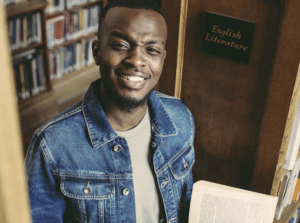 The following month, his acclaimed podcast, Have You Heard George’s podcast?, was nominated for, and subsequently won, a Peabody Award – one of the world’s oldest and most prestigious media prizes. His was the first British podcast ever to receive a nomination for a Peabody Award.
The following month, his acclaimed podcast, Have You Heard George’s podcast?, was nominated for, and subsequently won, a Peabody Award – one of the world’s oldest and most prestigious media prizes. His was the first British podcast ever to receive a nomination for a Peabody Award.